

Fear based control. Data Visualization. AlienScientist.com. The goal of this section of the website is to provide free, easy to understand, educational materials for the most important concepts in physics and math.
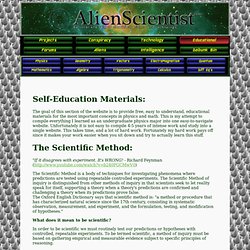
This is my attempt to compile everything I learned as an undergraduate physics major into one easy-to-navigate website. Unfortunately it is not easy to compile 4-5 years of intense work and study into a single website. This takes time, and a lot of hard work. AlienScientist.com. Does intelligent life exist on other planets?
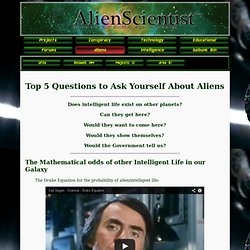
Can they get here? Would they want to come here? Would they show themselves? Would the Government tell us? The Mathematical odds of other Intelligent Life in our Galaxy. Physicists: The Universe Is A "Giant Brain" (5) 13 Moon Calendar. April 1 2007. A friend of our web site sent me a new book titled The Mystery of 2012.
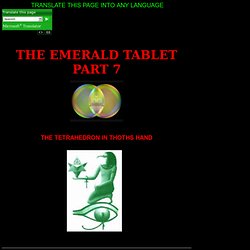
Predictions, Prophecies and Possibilities. It includes work by Gregg Braden, Peter Russell, Daniel Pinchbeck, Joanna Macy, John Major Jenkins and others. (The Power of I-AM) Learn to use the most powerful words ever spoken!
Psychedelics & Shamanism. Science. Hive Plots - Linear Layout for Network Visualization - Visually Interpreting Network Structure and Content Made Possible. 2008-08-26: code swarm - Dynamic visualization of Open Source Software project evolution. Still image from the Eclipse project visualization[Ogawa, 2008] A UC Davis graduate student has created short, colorful movies that show the development of open source software.
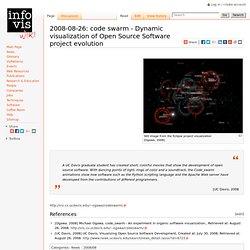
A Map of the Geographical Structure of Wikipedia Links. Click to enlarge!
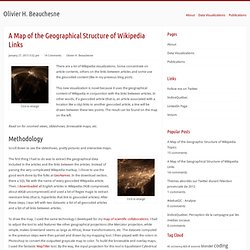
There are a lot of Wikipedia visualizations. Some concentrate on article contents, others on the links between articles and some use the geocoded content (like in my previous blog post). This new visualization is novel because it uses the geographical content of Wikipedia in conjunction with the links between articles. In other words, if a geocoded article (that is, an article associated with a location like a city) links to another geocoded article, a line will be drawn between these two points.
The result can be found on the map on the left. Visualization of wiki structure using prefuse visualization package.png. Data visualization - Network Visualisation for huge dataset composed of many unconnected clusters. Family (biology) What does and does not belong to each family is determined by a taxonomist — as is whether a particular family should be recognized at all.
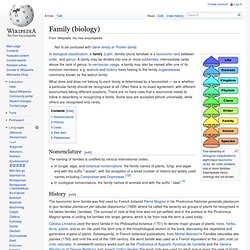
Often there is no exact agreement, with different taxonomists taking different positions. There are no hard rules that a taxonomist needs to follow in describing or recognizing a family. Some taxa are accepted almost universally, while others are recognised only rarely. The naming of families is codified by various international codes. Science. Systematic enterprise that builds and organizes knowledge The Universe represented as multiple disk-shaped slices across time, which passes from left to right Modern science is typically divided into three major branches that consist of the natural sciences (e.g., biology, chemistry, and physics), which study nature in the broadest sense; the social sciences (e.g., economics, psychology, and sociology), which study individuals and societies; and the formal sciences (e.g., logic, mathematics, and theoretical computer science), which study abstract concepts.
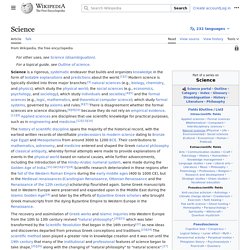
There is disagreement,[19][20][21] however, on whether the formal sciences actually constitute a science as they do not rely on empirical evidence.[22][20] Disciplines that use existing scientific knowledge for practical purposes, such as engineering and medicine, are described as applied sciences.[23][24][25][26] History. Science for Geshes. The Fabric of the Universe An overview of the boundaries of physical science by an experimental physicist.
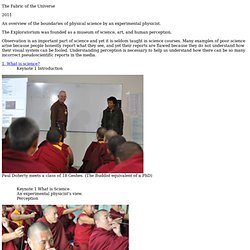
The Exploratorium was founded as a museum of science, art, and human perception. Observation is an important part of science and yet it is seldom taught in science courses. Many examples of poor science arise because people honestly report what they see, and yet their reports are flawed because they do not understand how their visual system can be fooled. Understanding perception is necessary to help us understand how there can be so many incorrect pseudoscientific reports in the media.
Computer program. A computer program written in an object-oriented style.
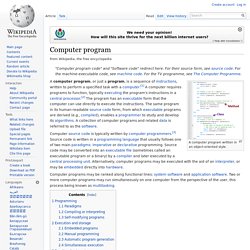
Computer programs may be ranked along functional lines: system software and application software. Two or more computer programs may run simultaneously on one computer from the perspective of the user, this process being known as multitasking. Programming[edit] Philosophy. Existence. Ontology is the philosophical study of the nature of being, existence or reality in general, as well as of the basic categories of being and their relations.
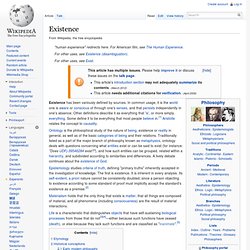
Traditionally listed as a part of the major branch of philosophy known as metaphysics, ontology deals with questions concerning what entities exist or can be said to exist (for instance: "Does UDFj-39546284 exist? "), and how such entities can be grouped, related within a hierarchy, and subdivided according to similarities and differences. A lively debate continues about the existence of God. Epistemology studies criteria of truth, defining "primary truths" inherently accepted in the investigation of knowledge.
Reality. Not to be confused with Realty. Philosophers, mathematicians, and other ancient and modern thinkers, such as Aristotle, Plato, Frege, Wittgenstein, and Russell, have made a distinction between thought corresponding to reality, coherent abstractions (thoughts of things that are imaginable but not real), and that which cannot even be rationally thought. By contrast existence is often restricted solely to that which has physical existence or has a direct basis in it in the way that thoughts do in the brain. Reality is often contrasted with what is imaginary, delusional, (only) in the mind, dreams, what is false, what is fictional, or what is abstract. At the same time, what is abstract plays a role both in everyday life and in academic research. Information. The ASCII codes for the word "Wikipedia" represented in binary, the numeral system most commonly used for encoding textual computer information In Thermodynamics, information is any kind of event that affects the state of a dynamic system that can interpret the information.
Etymology[edit] The English word was apparently derived from the Latin stem (information-) of the nominative (informatio): this noun is derived from the verb informare (to inform) in the sense of "to give form to the mind", "to discipline", "instruct", "teach". Communication. In the realm of biology in general, communication often occurs through visual, auditory, or biochemical means. Human communication is unique for its extensive use of language. Non-human communication is studied in the field of biosemiotics. Nonverbal communication[edit] Verbal communication[edit] Effective verbal or spoken communication is dependent on a number of factors and cannot be fully isolated from other important interpersonal skills such as non-verbal communication, listening skills and clarification.
Meaning of life. Philosophy. Philosophy is the study of general and fundamental problems, such as those connected with reality, existence, knowledge, values, reason, mind, and language.[1][2] Philosophy is distinguished from other ways of addressing such problems by its critical, generally systematic approach and its reliance on rational argument.[3] In more casual speech, by extension, "philosophy" can refer to "the most basic beliefs, concepts, and attitudes of an individual or group".[4] The word "philosophy" comes from the Ancient Greek φιλοσοφία (philosophia), which literally means "love of wisdom".[5][6][7] The introduction of the terms "philosopher" and "philosophy" has been ascribed to the Greek thinker Pythagoras.[8] Areas of inquiry. Modern philosophy. Consciousness.
Representation of consciousness from the seventeenth century At one time consciousness was viewed with skepticism by many scientists, but in recent years it has become a significant topic of research in psychology, neuropsychology and neuroscience. The primary focus is on understanding what it means biologically and psychologically for information to be present in consciousness—that is, on determining the neural and psychological correlates of consciousness. The majority of experimental studies assess consciousness by asking human subjects for a verbal report of their experiences (e.g., "tell me if you notice anything when I do this").
Logic. Argument. In a typical deductive argument, the premises are meant to provide a guarantee of the truth of the conclusion, while in an inductive argument, they are thought to provide reasons supporting the conclusion's probable truth.[6] The standards for evaluating non-deductive arguments may rest on different or additional criteria than truth, for example, the persuasiveness of so-called "indispensability claims" in transcendental arguments,[7] the quality of hypotheses in retroduction, or even the disclosure of new possibilities for thinking and acting.[8]
Proof (truth) A proof is sufficient evidence or an argument for the truth of a proposition.[1][2][3][4] Exactly what evidence is sufficient to prove something is also strongly area-dependent, usually with no absolute threshold of sufficiency at which evidence becomes proof.[12][13][14] In law, the same evidence that may convince one jury may not persuade another. Reason. Psychologists and cognitive scientists have attempted to study and explain how people reason, e.g. which cognitive and neural processes are engaged, and how cultural factors affect the inferences that people draw.
The field of automated reasoning studies how reasoning may or may not be modeled computationally. Animal psychology considers the question of whether animals other than humans can reason. Knowledge. Grief.
Language. Language. Semantics. Conspiracies.